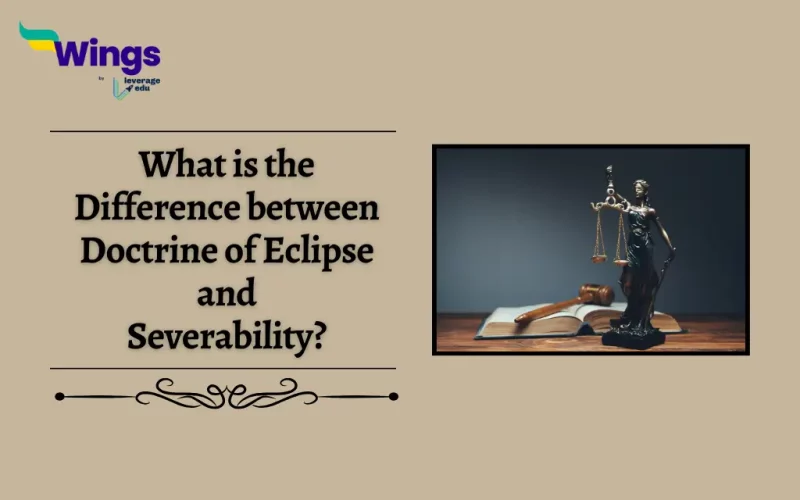The Doctrine of Eclipse means that if a law or act violates Fundamental Rights, it becomes unenforceable, yet it is not null or void. Moreover, the Rights simply eclipse or overshadow the law. The removal of the parts conflicting with these rights can regain enforceability. On the contrary, the Doctrine of Severability states that laws that are inconsistent with the provisions of the Fundamental Rights shall be void. However, the entire law would not be invalid, but only the provisions that are inconsistent with the Rights. Read on to learn about the Difference between the Doctrine of Eclipse and Severability.
Difference between Doctrine of Eclipse and Severability
Furthermore, here is a table that maps out the difference between both:
| Difference Between Doctrine of Eclipse and Doctrine of Severability | ||
| Feature | Doctrine of Eclipse | Doctrine of Severability |
| Meaning | It aims to preserve valid laws even if they contain unconstitutional elements, as long as the core purpose of the law is not defeated. | It allows for the removal of unconstitutional parts from law while keeping the valid portions intact and enforceable. |
| Goal | Protect Fundamental Rights while minimizing disruption to the existing legal framework. | Preserve legislative intent and validity of the remaining provisions of the law. |
| Applicability | Pre-Constitutional Laws. | All Laws. (Pre and Post-Constitution) |
| Judicial Interpretation | Courts may “eclipse” or nullify the unconstitutional parts of a law but preserve the remaining portions if they are separable and the law can still function effectively. | Courts have the power to “sever” or remove the unconstitutional provisions from the law while leaving the rest intact. Thus, assuring the law’s continued operation without violating constitutional rights. |
| Outcome | Unconstitutional parts of the law are rendered void, ineffective, or “eclipsed,” but the remainder of the law remains legally enforceable. | The unconstitutional provisions are severed, nullified, or “cut out,” leaving the valid portions of the law intact and capable of enforcement. |
| Examples | If a statute contains provisions that violate Fundamental Rights, such as the right to privacy, the offending parts may be “eclipsed” while the rest of the law remains valid. | A law imposes restrictions on free speech, but certain provisions are found to be unconstitutional. The court may “sever” those provisions while upholding the rest of the law. |
| Cases | In Bhikaji Narain Dhakras v. State of Madhya Pradesh. | In R.M.D.C. v. Union of India. |
Related Blogs
Lastly, we hope you liked our blog and gained an understanding of the Difference between the Doctrine of Eclipse and Severability. Moreover, you may even read more blogs and empower yourself with knowledge regarding Civics and Polity!
 One app for all your study abroad needs
One app for all your study abroad needs















 45,000+ students trusted us with their dreams. Take the first step today!
45,000+ students trusted us with their dreams. Take the first step today!
